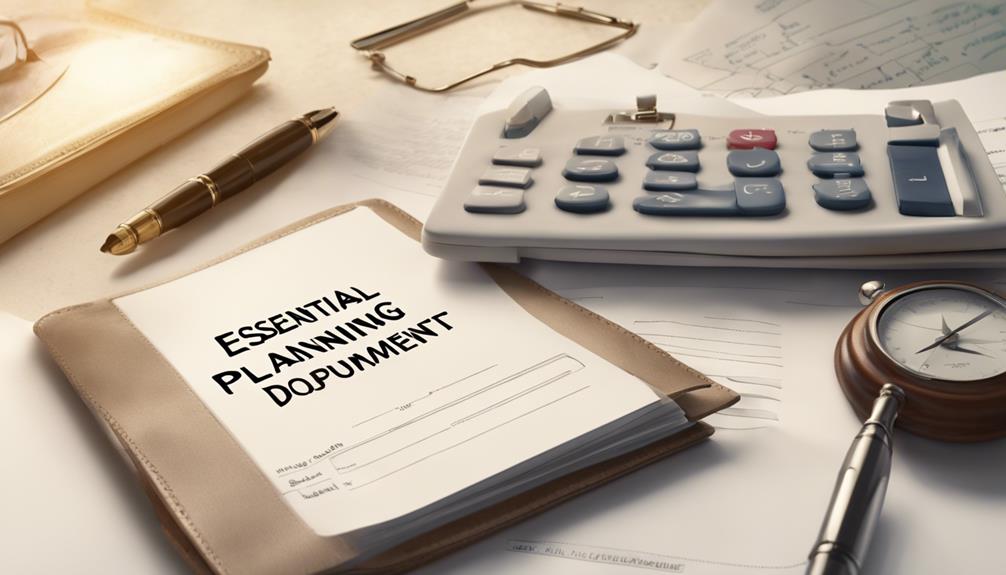As we maneuver through life’s challenges, we frequently handle a multitude of duties.
Just like a well-organized filing system brings peace of mind, having a Basic Estate Planning Checklist can help us navigate the intricate world of estate planning.
Starting with the basics and gradually building upon them, this checklist ensures that we lay a solid foundation for the future.
Let's explore how each step contributes to a comprehensive estate plan that safeguards our legacy and provides clarity for our loved ones.
Key Takeaways
- Establish will and trust
- Communicate with beneficiaries and executors
- Stay informed on state laws
- Seek guidance from estate planning attorney
Importance of Estate Planning
Estate planning is crucial for individuals to ensure that their assets are distributed according to their wishes after their passing. This process goes beyond just distributing assets; it helps avoid potential family disputes and confusion by clearly outlining who the beneficiaries are and what they'll receive.
Additionally, estate planning allows individuals to designate guardians for their minor children, providing reassurance that their children's care and financial needs will be met according to their wishes.
Essential Estate Planning Documents

When planning your estate, it's essential to ensure that you have the necessary documents in place to protect your assets and wishes. Common estate planning documents include wills, trusts, powers of attorney, and living wills.
Wills are crucial as they specify how assets should be distributed after death, ensuring your intentions are carried out and preventing intestacy. Trusts play a vital role in holding property for beneficiaries, expediting the asset distribution process, and providing flexibility in managing your estate.
Powers of attorney grant legal authority to individuals you trust to make financial, legal, or medical decisions on your behalf if you become incapacitated. Living wills outline your specific healthcare preferences in case of incapacity, ensuring your medical treatment aligns with your wishes.
Having these estate planning documents in order gives you peace of mind and helps safeguard your legacy, beneficiaries, and healthcare preferences.
Identifying Beneficiaries and Executors
After establishing your essential estate planning documents, the next critical step involves identifying beneficiaries and executors to ensure the smooth distribution of assets according to your wishes. Beneficiaries are individuals or entities designated to receive assets or property from your estate after your passing. Executors play a vital role in carrying out the instructions in your will, including the distribution of assets to beneficiaries.
To facilitate this process effectively, consider the following:
- Communicate: It's crucial to openly communicate with beneficiaries and executors to clarify your wishes and ensure they understand their roles.
- Update: Review and update beneficiary designations and executor choices periodically to reflect any changes in relationships or circumstances.
- Multiple Designations: You can name multiple beneficiaries and alternate executors to help ensure a smooth asset distribution process.
Understanding State Laws and Regulations

Understanding state laws and regulations governing estate planning is essential for ensuring the proper execution of your wishes and the effective distribution of your assets. State laws play a crucial role in outlining the requirements for creating valid estate planning documents, including wills and trusts. These regulations vary by state and have a direct impact on asset distribution, probate processes, and tax implications.
By familiarizing yourself with the specific legal provisions in your state, you can ensure that your estate plan complies with all necessary guidelines. Consulting with an estate planning attorney is highly recommended to navigate the complexities of state laws and regulations. An attorney can offer valuable insights into creating a comprehensive estate plan that aligns with your intentions and meets all legal requirements.
Securing Professional Assistance
Securing professional assistance from estate planning attorneys is crucial for ensuring the proper execution of your estate plan and compliance with state laws. Estate planning attorneys offer comprehensive services, including drafting legal documents for wills, trusts, and powers of attorney. They provide guidance on complex estate planning issues and ensure legal compliance with state laws.
Consulting with an attorney can help individuals navigate the nuances of estate planning, such as understanding tax implications and implementing asset protection strategies effectively. Professional assistance also helps in clarifying doubts, answering questions, and addressing specific concerns related to estate planning.
Attorneys ensure accuracy in paperwork, proper asset titling, and beneficiary designations, which are essential for effective estate management. By working with a knowledgeable attorney, you can rest assured that your estate planning needs are met with expertise and attention to detail.
Frequently Asked Questions
What Are the 7 Steps in the Estate Planning Process?
We believe the estate planning process involves seven vital steps to ensure a comprehensive plan. These steps include:
- Assessing assets
- Determining beneficiaries
- Choosing guardians
- Selecting a financial manager
- Drafting necessary documents
- Funding a trust if applicable
- Updating beneficiaries and asset titles
Decision-making around asset distribution, guardianship for minors, and financial management in case of incapacity are crucial aspects of this process.
Regular updates and reviews are recommended to reflect changing circumstances and align with your wishes.
What Are the Four Foundational Documents of an Estate Plan?
We've got the essentials for your estate plan covered:
- A will for asset distribution and guardianship
- A revocable living trust to manage assets
- A durable power of attorney for financial affairs
- A healthcare directive for medical preferences
These documents ensure your wishes are carried out smoothly and protect your interests during incapacity or after death.
It's crucial to have these foundational documents in place to safeguard your legacy and well-being.
What Are the 3 Main Priorities You Want to Ensure With Your Estate Plan?
We want to ensure our assets are distributed according to our wishes, provide for the financial needs of our minor children, and designate a guardian for them. It's also crucial to minimize estate taxes and probate costs while appointing a trusted individual to manage our assets if we become incapacitated.
These priorities form the foundation for a comprehensive estate plan that protects our loved ones and preserves our legacy.
What Are the Most Important Estate Planning Documents?
When planning for the future, the most important estate planning documents are wills, trusts, powers of attorney, and living wills. These crucial documents ensure that our assets are distributed according to our wishes, protect our loved ones, and provide clear guidelines for decision-making in case of incapacity.
Just as a sturdy foundation supports a building, these documents form the bedrock of a comprehensive estate plan, giving us peace of mind and security for the future.
Conclusion
In conclusion, by following the basic estate planning checklist, we can ensure our assets are protected and our loved ones are taken care of in the future.
It's like creating a roadmap for our legacy, ensuring everything is in order and organized for when the time comes.
With the help of professionals and careful consideration of our wishes, we can create a secure future for ourselves and our families.
Let's take the necessary steps to plan ahead and provide peace of mind for the future.









